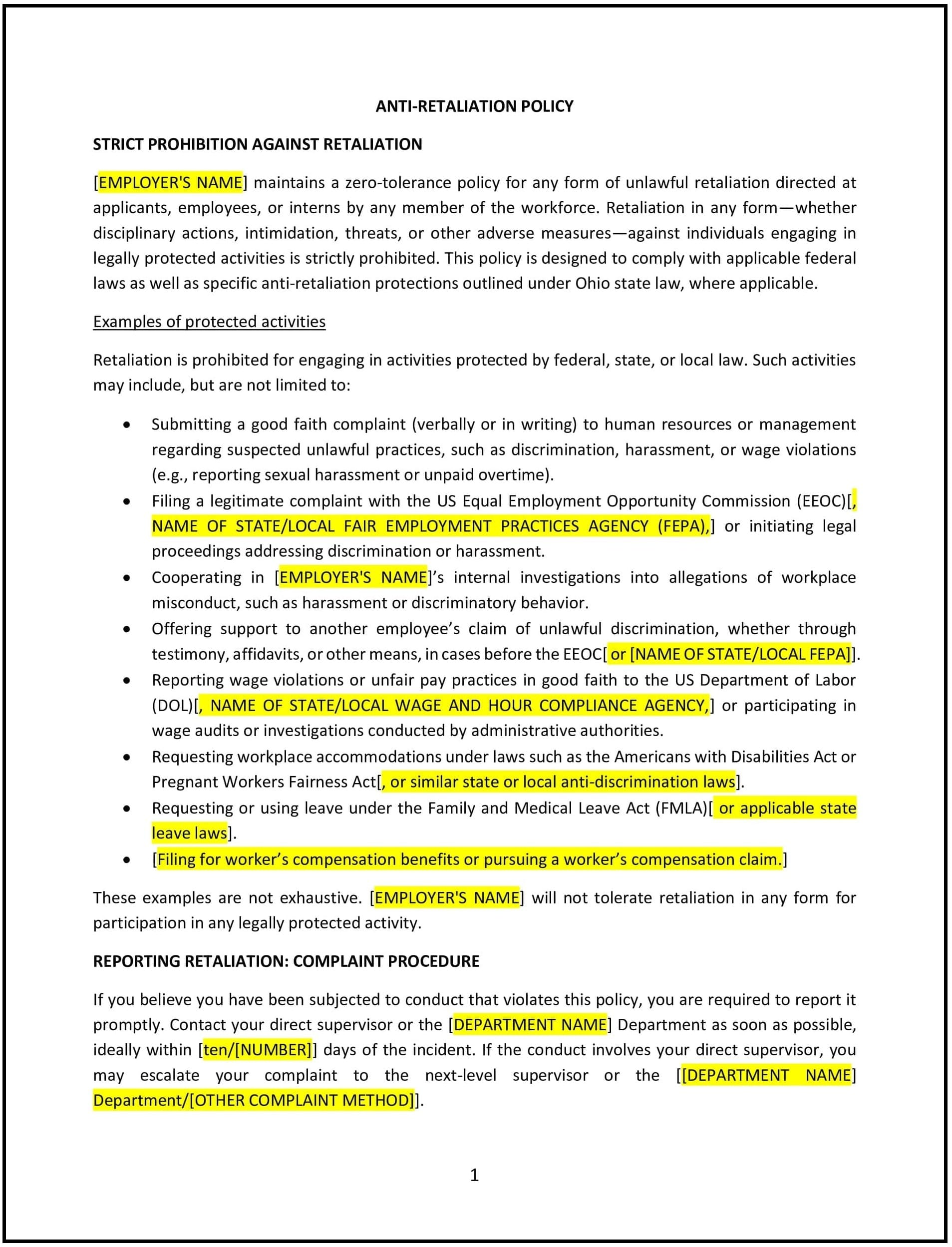Got contracts to review? While you're here for policies, let Cobrief make contract review effortless—start your free review now.

Customize this template for free
Anti-retaliation policy (Ohio)
An anti-retaliation policy outlines the protections for employees in Ohio who report concerns, participate in investigations, or assert their legal rights, ensuring they are not subjected to adverse treatment or retaliation. This policy helps safeguard employees who engage in protected activities, such as reporting violations of company policy, participating in investigations, or exercising their rights under Ohio state laws or federal regulations. It sets expectations for the workplace, emphasizing the importance of maintaining a fair, respectful, and non-retaliatory environment for all employees.
By implementing this policy, Ohio businesses can protect employees who speak up about issues, encourage a culture of openness, and reduce the risk of legal claims related to retaliation.
How to use this anti-retaliation policy (Ohio)
- Define retaliation: Clearly define what constitutes retaliation, including any adverse action taken against an employee for engaging in protected activities, such as being reassigned, demoted, denied promotion, or subjected to harassment.
- Outline protected activities: Specify what actions employees are protected for, such as filing complaints, participating in investigations, requesting accommodations, or reporting violations of company policies or laws.
- Establish reporting procedures: Create a straightforward and confidential process for employees to report retaliation. This should include clear steps for submitting complaints, identifying the appropriate point of contact (e.g., HR, a designated compliance officer), and any necessary documentation.
- Protect confidentiality: Ensure that retaliation complaints are handled confidentially, to the extent possible, and that the identity of the reporting employee is protected during the investigation.
- Define the investigation process: Specify how retaliation complaints will be investigated, including who will be responsible for conducting the investigation, the steps involved, and the expected timeline for resolving the issue.
- Emphasize consequences for retaliation: Outline the disciplinary actions that will be taken against employees who engage in retaliation, including corrective measures, suspension, or termination, depending on the severity of the incident.
- Promote a non-retaliatory work environment: Foster an environment where employees feel safe to report concerns or participate in investigations without fear of retaliation. The policy should encourage transparency and openness, and emphasize that reporting wrongdoing is valued.
- Ensure compliance with Ohio state laws: Ensure the policy aligns with Ohio state laws and federal regulations, including protections against retaliation for activities related to workplace discrimination, safety violations, or reporting unlawful conduct.
- Review and update regularly: Periodically review and update the policy to ensure it remains compliant with Ohio state laws, evolving workplace dynamics, and best practices for preventing retaliation.
Benefits of using this anti-retaliation policy (Ohio)
This policy provides several key benefits for Ohio businesses:
- Encourages a safe reporting culture: By protecting employees who report concerns or engage in investigations, the policy promotes a culture of transparency and integrity, encouraging employees to speak up without fear of retaliation.
- Reduces legal risks: A clear anti-retaliation policy helps mitigate the risk of retaliation claims, which could lead to costly legal proceedings and damages for the business.
- Enhances employee trust: When employees feel protected from retaliation, they are more likely to trust their employer and engage in positive behaviors, such as reporting unsafe practices or unethical conduct.
- Improves compliance with laws: This policy helps businesses comply with Ohio state laws and federal regulations that protect employees from retaliation, including those related to workplace discrimination and whistleblowing.
- Protects business integrity: A non-retaliatory environment helps protect the business from the risks of unethical behavior or corruption, as employees are more likely to report violations that affect the company’s operations and reputation.
- Promotes a positive workplace culture: By ensuring that employees are not penalized for asserting their rights or raising concerns, businesses foster a workplace culture based on fairness, respect, and mutual trust.
- Supports employee engagement: Employees who feel protected are more likely to remain engaged in their roles, contributing to higher morale, retention, and productivity across the business.
Tips for using this anti-retaliation policy (Ohio)
- Communicate the policy clearly: Ensure that all employees are aware of the anti-retaliation policy by including it in the employee handbook, during onboarding, and through periodic reminders in training sessions.
- Provide regular training: Offer training to employees, including management, to ensure they understand their rights under the policy and the consequences of engaging in retaliatory behavior.
- Make reporting easy: Ensure that employees have clear and accessible ways to report retaliation, such as a confidential hotline or a designated contact in HR.
- Investigate complaints thoroughly: When retaliation complaints are made, investigate them promptly and thoroughly to determine if retaliation occurred. Ensure the process is unbiased and maintains the confidentiality of all parties involved.
- Monitor the workplace environment: Keep an eye on workplace dynamics to ensure that no retaliation occurs after an employee reports a concern or participates in an investigation. Look for signs of subtle retaliation, such as changes in an employee’s responsibilities or treatment.
- Stay proactive: Encourage employees to report concerns early, before retaliation becomes a serious issue. Promote an open-door policy and ensure employees know that speaking up is valued.
- Review the policy regularly: Periodically review the policy to ensure it reflects any changes in Ohio state laws, federal regulations, or business practices that affect the protection of employees from retaliation.